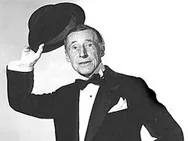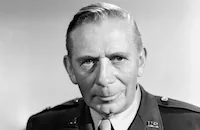Ma and Pa Kettle Back on the Farm

Brief Synopsis
Cast & Crew
Edward Sedgwick
Marjorie Main
Percy Kilbride
Richard Long
Meg Randall
Ray Collins
Film Details
Technical Specs

Synopsis
In a small town in Washington state, Kim, the daughter-in-law of high-spirited hillbillies Ma and Pa Kettle, is about to give birth. When Pa hears that "Mrs. Kettle" is in the delivery room, however, he mistakenly assumes that Ma is having their sixteenth child, and is surprised to hear that the baby was delivered while Ma was standing at the water cooler in the hall. After the mistake is cleared up, Ma and Pa return home with the baby's father, their son Tom. There, they are dismayed to discover that Kim's parents, Jonathan and Elizabeth Parker, are coming earlier than planned so there is no time to clean the house. When the upper-class Parkers arrive, Mrs. Parker is horrified at the dishevelment of the Kettle home and family. Soon, Mrs. Parker's snobbery and bossiness begin to anger Ma, and though she agrees to be hospitable for Tom's sake, her patience is continually tested. When Kim brings baby Jonathan home, Mrs. Parker insults Ma by insisting on hiring a nurse to teach the Kettles about hygiene. Then, when the Kettles' Indian friends visit bearing baby gifts such as hawks and a puppy, Mrs. Parker calls them "germ-carrying heathens" and insists that they leave. Hearing this, Tom chastises Mrs. Parker, causing Kim to shout at him. Ma decides that the Parkers should stay in the house while the Kettles relocate to their old farmhouse outside of town. At the farm, when the habitually lazy Pa wakes up one morning determined to fix everything that is broken, Ma worries about his mental health. While Pa and his Indian friends, Geoduck and the mute Crowbar, go to work blasting a new well, two shady men searching for uranium deposits find evidence of the ore in the farm soil. Soon after, Pa falls into the well, and when he climbs out he finds that he can generate electricity spontaneously. Mr. Parker, a retired mine owner who, unlike his wife, appreciates the Kettles' hominess, deduces that Pa's radioactivity must be due to uranium-rich soil in his coveralls pockets. He informs the Kettles that they are about to become very rich. They then discuss with Geoduck, Crowbar and their friend, local salesman Billy Reed, how they would like to share the profits among them all. While they talk, however, Tom arrives and despondently tells them that Mrs. Parker has talked Kim into leaving him and taking the baby from the hospital, where it is staying because of a cold, back to Boston. That night, Billy, Geoduck and Crowbar sneak into the hospital and attempt to steal the baby back for Tom. Each man, however, grabs a girl baby instead of little Jonathan. When the sheriff arrives, Ma and Pa have to trick him into taking the babies back without pressing charges. The next day, the two shady men inform Ma and Pa that they have bought the farm by paying the back taxes owed on it, but Mr. Parker brings in a uranium expert to convince them that the land is useless, and the men agree to give Pa the deed to the farm and ten dollars. As soon as they leave, however, the expert reveals to Parker that the land really is barren, and Mr. Parker realizes that the only radioactive element on the property is Pa's coveralls, which his nephew wore during overseas atomic bomb tests. As the Kettles celebrate the payment of their back taxes, Tom announces that Mrs. Parker and Kim have boarded a train to Boston, causing Mr. Parker, Tom, Ma and Pa to give chase. They manage to stop the train, and when Tom stands up to Kim and Mr. Parker rebukes his wife for the first time, Mrs. Parker realizes the error of her ways. She and Ma, however, do not disembark in time, and are forced to stop the train in the middle of a field and use a railroad hand car to get home. By the time Pa, Mr. Parker, Tom and Kim return to the house, Ma and Mrs. Parker have prepared dinner for the whole happy family.

Director

Edward Sedgwick
Cast

Marjorie Main

Percy Kilbride

Richard Long
Meg Randall

Ray Collins
Barbara Brown
Emory Parnell

Peter Leeds
Teddy Hart
Oliver Blake
Hugh Soldana
Crew
Leslie I. Carey
Oliver Emert
Russell A. Gausman
Joseph Gershenson
Leonard Goldstein
Billy Grady Jr.
Jack Henley
Bernard Herzbrun
Bill Holland
David S. Horsley
Emrich Nicholson
Robert Pritchard
Russell Schoengarth
Milton Schwartzwald
Joan St. Oegger
Charles Van Enger
Bud Westmore

Videos
Movie Clip



Hosted Intro
Film Details
Technical Specs

Articles
Ma and Pa Kettle Back on the Farm
The baby's parents, Tom Kettle and Kim Parker, the news reporter he married in the 1949 picture, are played once again by Richard Long (of later Big Valley fame) and Meg Randall. The two young actors virtually started their careers together, appearing as a couple five times within the first five years they were on screen, three times in the Kettle series as well as in the comedy The Life of Riley (1949) and the film noir thriller Criss Cross (1949). This was their last appearance with Ma and Pa, although the characters would be mentioned by name in later installments. Kim's parents, played by Ray Collins and Barbara Brown, were supposed to have appeared in the second film, Ma and Pa Kettle Go to Town (1950), but their scenes were cut before its release.
The supporting players, however, weren't the draw here. Audiences wanted to see the raucous Ma and the indolent Pa in full-out absurd action, and Main and Kilbride delivered. But if the actress had her way, this and all the other episodes might never have happened. Not that she didn't like the part; the problem was that Main bridled over the notion that both MGM, the studio that had her under contract, and Universal, where the Kettle films were made, were making a fortune off the series with their mutual agreement for her services, while she received only her standard salary. She knew that if she refused to make another Kettle movie, MGM would put her on indefinite suspension, and she considered taking that career risk. In the end, however, she kept right on doing the role, reasoning that "I would rather make people laugh than anything else." At least she got to do many other movies between the Kettle assignments. Other offers were rare for Percy Kilbride, who had a long stage career prior to his work on film, and who became typecast in country bumpkin roles, although he was born and raised in San Francisco. Starting with this film, he never played another role except Pa Kettle and retired from acting in 1955.
Both actors had mishaps on the set, perhaps the result of making the farm a little too realistic. The move back to the old location required a certain amount of reverse renovation by studio set workersreapplication of rust, loosening of floor boards, a front door made to constantly fall, and hip-high weeds planted in the yard. Their efforts may have been a little too successful. Filming her very first scene, Main stepped out of the front door of the rickety farmhouse and fell right through the porch floor. It took four crew members to haul her out through the rotted planks. Kilbride had the entire chicken coop collapse on his head. Fortunately neither was hurt.
Marjorie Main celebrated a birthday during production, bringing the filming to a halt for an entire afternoon. In addition to gifts and a birthday cake, she was touched by receiving a huge floral display sent by veterans of the Army's 96th Infantry Division, who had adopted her as a mascot during World War II.
Ma and Pa Kettle Back on the Farm was directed by Edward Sedgwick, who had been behind the camera on several Buster Keaton pictures starting with The Cameraman (1928) and including most of the actor's early talkies. Nearing the end of his life and more than 30-year career, Sedgwick made only two more movies after this, doing uncredited work on the Red Skelton vehicle Excuse My Dust (1951) and the little known I Love Lucy movie released in 1953. Consisting of three of the series early episodes strung together with additional footage to give the feel for what it would be like to be a part of the television studio audience, it was shown only once, to a test audience in Bakersfield, CA, and received an enthusiastic reponse. However, the film's release was blocked by MGM, which was about to premiere Lucille Ball and Desi Arnaz in The Long, Long Trailer (1953), billing it as the couple's return to the big screen.
Director: Edward Sedgwick
Producer: Leonard Goldstein
Screenplay: Jack Henley
Cinematography: Charles Van Enger
Editing: Russell Schoengarth
Art Direction: Bernard Herzbrun, Emrich Nicholson
Cast: Marjorie Main (Ma Kettle), Percy Kilbride (Pa Kettle), Richard Long (Tom Kettle), Meg Randall (Kim Parker Kettle), Ray Collins (Jonathan Parker), Barbara Brown (Elizabeth Parker).
BW-81m.
by Rob Nixon

Ma and Pa Kettle Back on the Farm
Quotes
Trivia
Notes
The working title of this film was Ma and Pa Kettle Back Home. The film marked the last of Milton Schwartzwald, head of Universal's music department from 1946 to March 1950, who died of a heart attack. Ma and Pa Kettle Back on the Farm was the third in Universal's "Ma and Pa Kettle" series. For more information on the series, please consult the Series Index and see the entry for Ma and Pa Kettle in AFI Catalog of Feature Films, 1941-50.















